Amazon takes on AMD, Intel with powerful Arm-based Graviton3 CPU
Trio locked in “Epyc” battle for the cloud computing domination

Amazon Web Services has announced new instances for EC2 in the shape of the C7g.
Announced at the company's AWS re:Invent event, the new instances will be powered by its newest processor, the Graviton3, which is aimed at what AWS labels as, compute-intensive workloads: HPC, batch processing, electronic design automation (EDA), media encoding, scientific modeling, ad serving, distributed analytics, and CPU-based machine learning inferencing.
So don't expect them to pop up in traditional web hosting environments although they can be used for bare metal hosting or in dedicated servers/VPS-like scenarios.
Graviton2 was announced in December 2019 and launched only in June last year while the original Arm-based Graviton was presented at re:Invent 2018.
This news is developing
Graviton3: What do we know?
Well, AWS says the new edition is 25% faster than the Graviton2, with 2x floating point performances and 3x improvements in machine-learning workloads. Power consumption will be 60% lower - although not much is known about the exact parameters.
They will run on DDR5 memory which should deliver a 50% increase in memory bandwidth. We don't know the core count, the architecture used or the core clock speed.
Are you a pro? Subscribe to our newsletter
Sign up to the TechRadar Pro newsletter to get all the top news, opinion, features and guidance your business needs to succeed!
Graviton2 doubled the core count from the original 2018 model to 64-core and used the ARM Neoverse N1 architecture, a 7nm manufacturing process, which allowed it to reach 2.5GHz.
Graviton3 will face fresh competition from AMD and Intel. The former is expected to introduce its Zen 4 products in 2022 with processors using up to 128 cores on a 5nm process. Intel has already unveiled its Xeon "Sapphire Rapids" processors which brings DDR5 and PCIe 5.0 to the table.
- Follow our live blog of AWS re:Invent 2021

Désiré has been musing and writing about technology during a career spanning four decades. He dabbled in website builders and web hosting when DHTML and frames were in vogue and started narrating about the impact of technology on society just before the start of the Y2K hysteria at the turn of the last millennium.